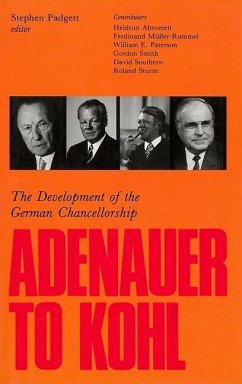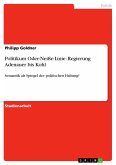The German Chancellorship is an office beset by paradox. As leader of Europe's largest and most powerful state, the Chancellor is a key figure on the stage of international politics. Yet the constraints of the legacy of the past mean that Chancellors are unable to emulate French Presidents in their cultivation of the politics of grandeur. Moreover, the fragmented power structure of domestic politics normally precludes the exercise of the 'heroic' style of leadership. This volume explores these paradoxes, defining the scope of Chancellor leadership and its limits, asking whether post-unification Germany needs a wider repertoire of leadership styles and skills than that of the old Federal Republic. Adenauer to Kohl combines an analysis of the structural foundations of executive leadership in Germany with a study of the six postwar Chancellors. It explains variations in performance between Chancellors who dominated and shaped the political landscape of the Federal Republic, and those who merely trod fleetingly across it. In so doing, the contributors to the book assess which of the available models, 'Chancellor democracy' or 'coordination democracy', provides the most useful analytical framework for understanding the office and its incumbents. The authors provide a detailed examination of the parameters of executive leadership in Germany, examining the constitutional framework (Southern); Chancellor-party relations (Padgett); executive management (Sturm); the role of the Chancellor's Office (Muller-Rommel); the Chancellor in foreign policy and policy-making (Paterson); and his relations with organised interests (Abromeit). The book ends with an historical interpretation of the changingparameters of Chancellor authority.
Hinweis: Dieser Artikel kann nur an eine deutsche Lieferadresse ausgeliefert werden.
Hinweis: Dieser Artikel kann nur an eine deutsche Lieferadresse ausgeliefert werden.








